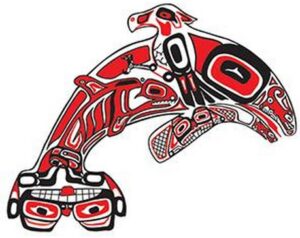Indigenous peoples have been among the most vocal proponents of solutions to climate change effects, but their advocacy has often been marginalized. A recent conference titled Evergreen Tribes and Climate Change Conference at the Squaxin Island Tribe’s Little Creek Hotel (November 8-9) made that advocacy more visible.

One hundred faculty from 20 colleges attended, many of them as part of teams committed to bringing learning back to their campuses.
A second conference, in eastern Washington, convened leaders from Tribes and First Nations across the US, in a “national summit,” reflecting the momentum behind the tribal nations’ climate leadership. That three-day conference engaged tribal leaders, citizens, staff, youth and collaborators in conversation about navigating the cultural, economic, and social challenges of climate change.
The Evergreen Conference was designed to introduce mostly non-native educators to the ways tribes are leading responses to climate change, including mitigation and adaptation, in the context of the government to government relationships that characterize our state.
Presenters included leaders from eleven different tribes. These leaders provided vivid and detailed descriptions of the climate change challenges they are facing and the significant adaptations they are making. Running through all of the sessions was a theme of tribal resilience and adaptation, reflecting the forward-looking work of the tribes.
The conference began with an overview of climate issues in eastern and western Washington presented by Tulalip leader Daryl Williams and Phil Rigdon, Superintendent of the Yakama Nation’s Natural Resources Department. The keynote on the second day featured a plenary by Willie Frank III and David Troutt, Nisqually Tribe, on treaty rights and climate change.
Tribes on the move
The University of Washington and Evergreen State College are collaborating with tribes on various climate-related projects on tribal land at Shoalwater Bay, Chehalis, Quinault and Nisqually.
Heather Price (North Seattle Community College) and Sonya Doucette (Bellevue College) described the launch of a project focused on justice and civic engagement through WA State’s community colleges, supported through a legislative budget allocation from the last session.
Steve Robinson, Legislative/Education Policy Analyst with the Northwest Indian Fisheries Commission, led a session organized around his case study entitled, “Quinault Indian Nation: Living on the Edge.” Quinault is in the midst of moving their entire lower village in the face of rising oceans. A new upper village is being designed to provide ready access to a shared community center for all ages, with sidewalks, trails, and facilities located within a 5- to 10-minute walk of the majority of housing. Low-impact design best practices will be used to treat stormwater runoff. Advisory guidelines for energy efficiency in homes and public buildings are being assembled, and streets are being laid out in an east-west manner to encourage passive solar design. (1)
Larry Burtness, planner and grant writer for the Quileute Tribe, led a session describing how the Quileute are “moving to higher ground” to preserve and protect the tribal community.
In August the Quileute celebrated the opening of a new school on higher ground after the Obama administration transferred more than 700 acres to the Tribe.
The Swinomish Tribe is in the midst of a Climate Change Initiative, a two-year project which in its own words is to “assess local impacts, identify vulnerabilities, and prioritize planning areas and actions to address the possible effects of climate change.” An action plan and other long-range solution products will emerge from this work.
According to their description of the project, the Swinomish task goes beyond addressing shoreline risk and restoring habitats. The tribe looks at climate adaptation and resilience with eyes ranging across generations, recognizing that the endangered “first foods”—clams, oysters, elk, traditional plants and salmon—are not mere resources to be consumed. They are central to indigenous values, beliefs and survival. (2)
Important new resources
In support of their leadership on climate change, ten tribes and two tribal organizations in Washington state will receive grants from the Bureau of Indian Affairs.
According to Senator Maria Cantwell, “Washington state Tribes are located in the eye of the climate change storm. Some Tribes need to relocate buildings and homes now because of sea-level rise and the threat of tsunamis. Others are working to protect salmon and critical fisheries from warming water temperatures and drought, while other Tribes are simply trying to find ways to adapt to their changing lands and waters.”
A total of 21 grants totaling $10,767,838 will help combat the disproportionate impact of climate change on tribal communities. Washington state tribal nations will be able to use the funds for ocean and coastal planning, relocation, and climate adaptation that is necessary to protect tribal lands and waters.
After the close of the Evergreen conference, one participant reflected on the fact that the work of tribal nations is rarely visible: “I had no idea the tribes were leading this work. Not just that, but I learned about the status of tribes as political entities within our state. It was an eye-opening experience.”
Emily Lardner is a member of the WIP publishing committee and a former faculty member at The Evergreen State College.
(1) From the Quinault Nation website.
(2) Swinomish Climate Change Initiative

Be First to Comment